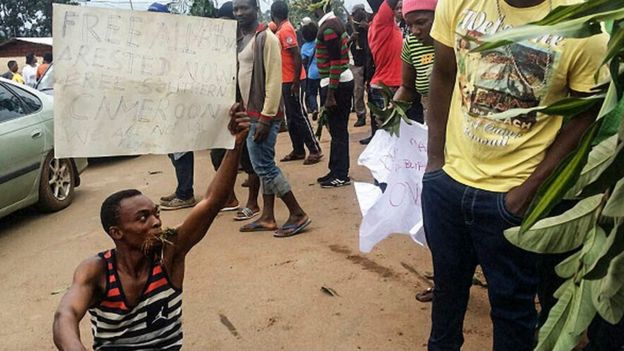A judge in Cameroon has ordered the release of a US-based author and academic who was detained for allegedly threatening President Paul Biya's life.
The judge ruled that Patrice Nganang should be expelled from the central African state, his lawyer said.
No official reason was given for the the decision to free the US citizen.
Mr Nganang was detained three weeks ago as he was about to fly out of his country of birth. He is a fierce critic of Mr Biya's 35-year rule.
The government accused him of threatening to shoot the president in a Facebook post, allegedly written after he visited the restive Anglophone west in mostly French-speaking Cameroon.
Mr Nganang pleaded not guilty during a court appearance on 15 December.
His lawyer, Emmanuel Simh, said the case was "purely political nature" against someone who was strongly opposed to Mr Biya's regime.
Mr Nganang is a literature professor at New York's Stony Brook University.

He is also the author of several prize-winning novels, including "Temps de Chien", or "Dog Days", which focuses on life in Cameroon under the rule of Mr Biya.
Mr Nganang's Cameroonian passport was seized and he was arrested, as he was about to board a flight to Zimbabwe.
His family and friends said he had been detained for writing an article for French magazine Jeune Afrique, criticising Mr Biya's government for his handling of protests by English-speaking Cameroonians.
Dozens were killed in November in a violent crackdown on protests.
Many English speakers accuse the Francophone majority of discrimination.
They say they are often excluded from top civil service jobs, and that the French language and legal system have been imposed on them.
The government denies the allegations and insists that it treats all citizens equally.
The divisions in the central African state date back to the post-colonial settlement.
Cameroon was colonised by Germany and then split into British and French areas after World War One.
Following a referendum, British-run Southern Cameroons joined the French-speaking Republic of Cameroon in 1961.
It is now divided into the South-West and North-West regions.
Demands for independence have grown in the two regions in recent years and the government has vowed to end attacks blamed on armed secessionists
Latest Stories
-
Chief of Staff champions exercise culture to promote healthy living among Ghanaians with ‘Walk with Julius’ initiative, calls on corporate Ghana to join JoySports Invitational Tournament
7 minutes -
NSMQ 2025: St Peter’s SHS claims 4th Eastern Regional title after intense showdown with Okuapeman and Pope John’s
18 minutes -
Tera Hodges confirmed as speaker for Africa’s Women’s Day Virtual Celebration 2025
33 minutes -
Gospel artiste Terry Johnson releases soulful new single “Ohe yɛ naakpɛɛ”
1 hour -
Nearly 200 Ghanaian students stranded as gov’t owes University of Memphis $3.6m
1 hour -
At least 14 dead in South Korea floods and landslides
2 hours -
You’ve kept to the objective – Chief of Staff Julius Debrah hails MGL
3 hours -
Cape Coast hosts final leg of National Talent Identification Program for Para athletes
4 hours -
ESG and Boardroom Decisions: How Non-Financial Drivers Shape Financial Outcomes
5 hours -
Robust anti-laundering fight critical for regional stability – Veep
9 hours -
Car ploughs into crowd outside LA nightclub, injuring 30
10 hours -
GNAT President calls for parliamentary legislation to protect reinstated PTAs
12 hours -
NPP Abanga blames his NDC twin brother for his misfortune
13 hours -
NPP Abanga breaks ranks to shield NDC twin brother in ‘galamsey’ accusations
13 hours -
Saminu Abdul Rasheed smashes national record again with 9.84s sprint in Georgia
14 hours

